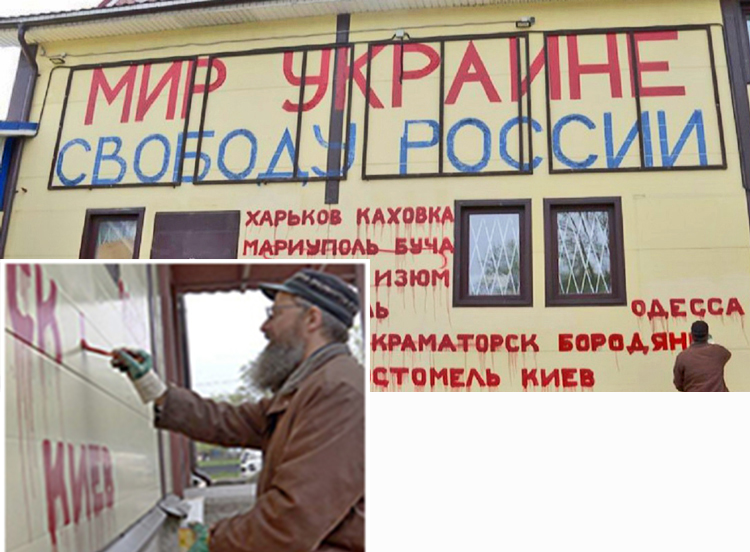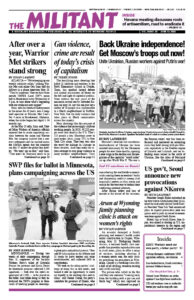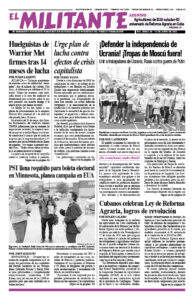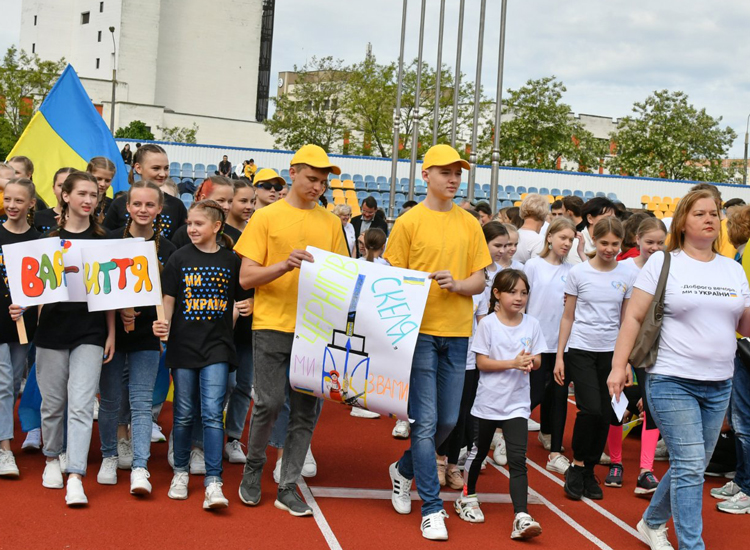Moscow’s invasion and murderous bombardment of Ukraine has been resisted tenaciously by the Ukrainian people for over three months, opening a new stage in the decline and disintegration of the capitalist “world order” set up after World War II. The war is exacerbating the worldwide economic crisis coming down on workers’ backs and sharpening conflicts among rival imperialist powers as they rearm and search for the best way to defend their conflicting national interests.
After facing defeat and loss of morale at the outset of the invasion, the Russian rulers’ war has been refocused and narrowed on extending areas they hold aloung with pro-Moscow separatists in the Donbas region of Donetsk and Luhansk, and on defending areas seized in the south of Ukraine, like the cities of Mariupol and Kherson.
Under cover of continual and deadly artillery bombardment, Moscow’s forces fought their way into the city of Severodonetsk, in Luhansk province. Ukrainian forces are inflicting heavy losses on the invaders, but lacking long-range artillery were pushed out of the city.
About 13,000 civilians remain in shelters there, out of a prewar population of 100,000. Many hundreds have been killed and large swathes of buildings and infrastructure obliterated.
Ukrainian forces launched a limited counterattack in the southern region around occupied Kherson. This has forced Moscow to divert troops from their Donbas offensive. Moscow also canceled plans to stage a rigged “referendum” to incorporate the area into Russia. Kherson residents held daily protests in March until the occupiers savagely clamped down, but still find ways to express support for Ukraine.
Protesters in Melitopol against the Russian occupation May 29 held signs saying, “Melitopol is Ukraine,” part of broader actions organized by the “Yellow Ribbon” movement.

Resistance by Ukrainians in other occupied areas is also causing problems for Moscow. Networks of thousands inform the Ukrainian military about the movements of enemy troops and equipment. Some stage guerrilla attacks on warehouses and occupying forces.
With depleted infantry reserves, the Russian government is recalling troops from Syria and elsewhere. The Kremlin has been forced to merge depleted army units, many exhausted with low morale and short of officers. Russian President Vladimir Putin scrapped the upper age limit of 40 for recruits May 28. Russian casualties from three months of war in Ukraine are estimated to be higher than those suffered by soldiers from the Soviet Union during Moscow’s 10-year invasion and occupation of Afghanistan.
The Ukrainian people’s defense of their country’s sovereignty has deep roots. Putin seeks to force back under Moscow’s domination peoples that had previously been conquered by the czars, whose empire was known as a “prison house of nations.” Ukraine won its independence in the early 1920s after the Russian Revolution led by V.I. Lenin and the Bolsheviks overturned capitalist rule and established a workers and farmers government. It drew widespread support from Ukrainians and other oppressed peoples.
A counterrevolution led by Joseph Stalin from the mid-1920s overthrew Lenin’s policy supporting national self-determination and drove working people from power. It once again imposed Moscow’s domination of Ukraine. Independence was secured again after the disintegration of the Soviet Union in 1991. Millions of working people took to the streets of Ukraine in 2014 to oust the brutal pro-Moscow regime of Viktor Yanukovych.
Divisions among imperialist powers
While Washington is the biggest provider of weapons to Kyiv, it does so to advance its own imperialist interests, not to defend working people in Ukraine. The U.S. rulers aim to reassert their place as the dominant power in Europe, at the same time as they seek ways to check the rise of Beijing, their main economic and military competitor today. This has further destabilizing consequences for the capitalist world order.
Washington has assured the Kremlin that it won’t provide Ukraine with weapons that will provoke Moscow. “We are not going to send to Ukraine rocket systems that can strike into Russia,” President Joseph Biden told the media May 30.
The next day, Biden announced advanced rocket-launching systems with medium-range missiles would be supplied to Kyiv. But Washington refused to provide the longer-range missiles they can fire.
Divisions among Washington and other capitalist powers in the NATO alliance are sharpening. The governments of the U.K. and Poland, for their own interests, are pushing for more armaments for the Ukrainian army. Those of Germany, France and Italy are holding their own discussions with Putin, hoping to draw Moscow into negotiations with Kyiv to wind down the war. They fear deepening instability in Europe and are worried about more economic dislocation and a growing crisis at home.
After decades of refraining from doing so, the rulers of Sweden and Finland have applied to join the Washington-led NATO military alliance, fearing threats from Moscow. President Recep Tayyip Erdogan of Turkey, a NATO member, is threatening to veto their applications, demanding they drop all criticism of the Turkish rulers’ assaults on the Kurdish people’s struggle for national rights in Syria.
Sanctions hit working people
Under severe U.S.-led sanctions, everything from paper and buttons to airline spare parts are in short supply in Russia. Unemployment is growing as bosses from factories to retail chains are forced to close them. A thousand brand-name foreign companies have cut production and sales in Russia. Soviet-era style shortages, shoddy locally produced goods, and inflation are on the rise.
A March 3 statement issued by Jack Barnes, national secretary of the Socialist Workers Party, on behalf of the SWP’s National Committee, explains the party “opposes the broadly aimed economic and financial embargo imposed on Russia by the U.S., European and other imperialist ruling classes, as well as military maneuvers by these governments.” Those sanctions, whoever they target, worsen the economic crisis in Russia and end up imposing the greatest hardships on working people. They cut across forging working-class solidarity between the toilers of Ukraine, Russia and around the world, including in the U.S.
Opposition to the war by working people in Russia, including in the ranks of Moscow’s army, continues. One hundred fifteen members of one domestic security force were fired after refusing to go and fight in Ukraine. A court rejected a lawsuit brought by the national guardsmen in their defense May 25.
Many hundreds more have been dismissed for refusing to fight, the Wall Street Journal reported June 1. Seeking to avoid publicizing the issue, the Kremlin hasn’t charged them.
The highest-ranking Russian diplomat to quit so far, Boris Bondarev, resigned from the country’s mission to the U.N. in Geneva May 25, saying the invasion was a “disaster.” He said, “Never have I been so ashamed of my country as on Feb. 24.”
Putin’s war has aggravated the economic and political contradictions that drove the Kremlin to use its military might in the first place. Now the Russian rulers face not only a deeper economic crisis at home, but the challenge of imposing their rule against the wishes of Ukrainians in parts of the country they occupy.


